Big Red Book
Celebrating television's This Is Your Life
Producing Life
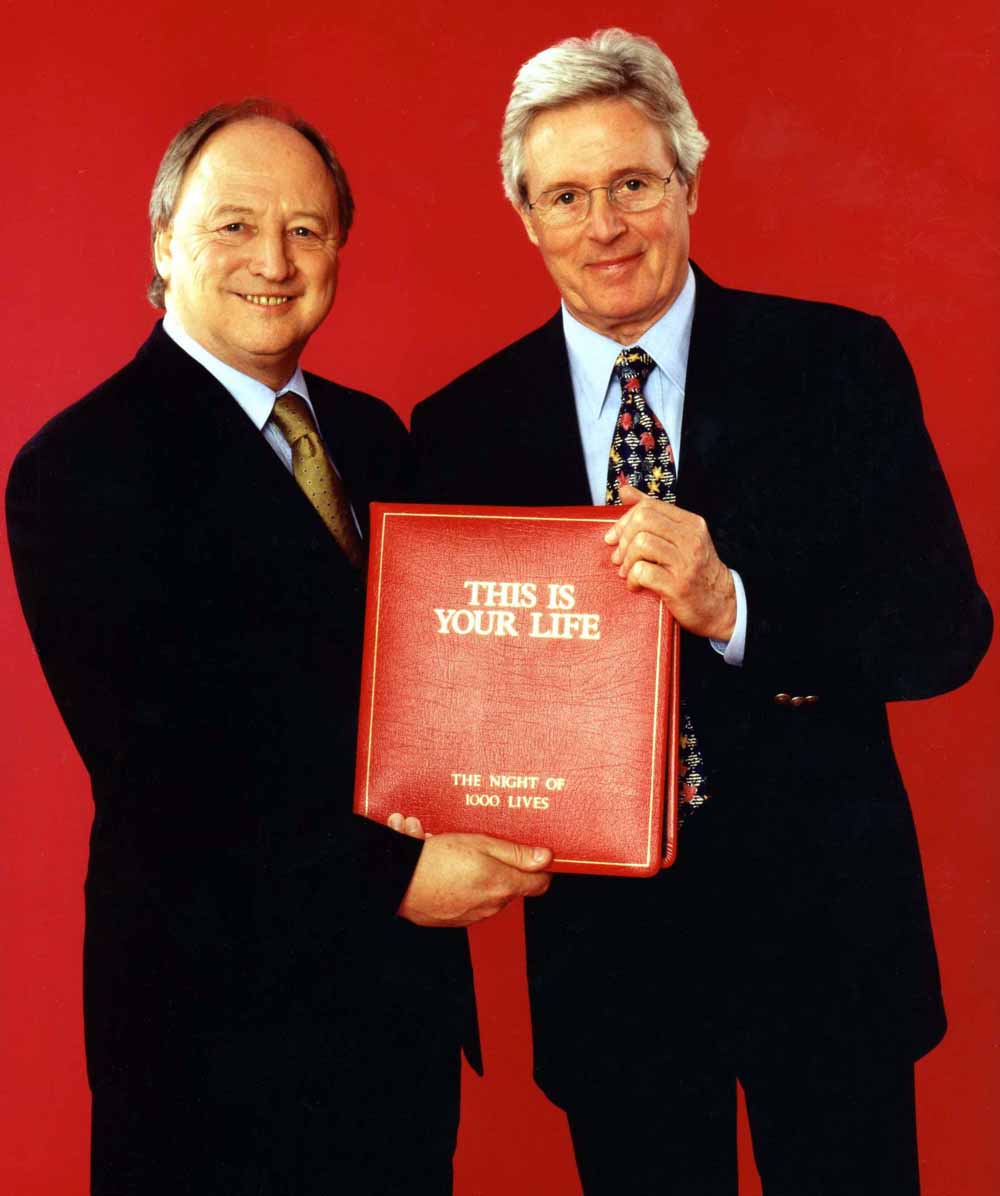
"...more people watch This Is Your Life standing up than sitting down - they walk in through the room, and they see This Is Your Life and they say 'I wonder who it is', and they stay and watch it - and that's where it gets it's audience from..."
So said Leslie Jackson - the first Producer of This Is Your Life.
The role of a television producer is to oversee all aspects of a programme – they control the look, feel and content of the show – and in the case of This Is Your Life, are involved with selecting subjects, planning research, finalising the guest list and tweaking the final script – as well as dealing with a million other things!
It's a credit to those who held the position of This Is Your Life Producer that the programme maintained its position as a television institution for almost 50 years.
roll call of producers...
T Leslie JACKSON
Producer: Series 1 - 8
Executive Producer: Series 9
Vere LORRIMER
Director: Series 3 - 8 (various)
Producer: Series 9
Robert TYRRELL
Producer: Series 10 - 11
Malcolm MORRIS
Producer: Series 12 – 14 / 23 – 36
Co-Director: Series 31 - 33 (various)
OB Director: Series 34 - 35 (various)
Jack CRAWSHAW
Researcher: Series 10 - 11 (various)
Writer: Series 10 - 14 (various)
Programme Editor: Series 14
Producer: Series 15 – 22
Editorial Consultant: Series 37
Series Producer: Series 38 – 43
John GRAHAM
Researcher: Series 19 - 22 (various)
Programme Associate: Series 23 - 24
Associate Producer: Series 30 – 36
Producer: Series 37
Sue GREEN
Researcher: Series 26 – 36 (various)
Associate Producer: Series 37
Producer: Series 38 – 43
related pages...
tributes to the original presenter
the programme's best kept secrets
the show's fifty year history
the genesis of the programme
the programme's relaunch
The Story of This Is Your Life
a BBC Did You See...? special
This Is Your Life: The Show that can never be fully rehearsed
TV Mirror goes behind-the-scenes of the first series
What goes on behind that Green Door
The Acton Gazette goes behind-the-scenes
Interview with the first producer of This Is Your Life
Radio Times interviews producer Leslie Jackson
Producer Robert Tyrrell reveals some 'cloak and dagger' tactics
Somewhere, Someone - This Is Your Life
Talk of Thames feature on the programme's 1969 relaunch
New producer Malcolm Morris reveals more behind-the-scenes secrets
Being gentlemen solves many of Life's problems
TV Times interview with new producer Jack Crawshaw
Mr Crawshaw ... This is your nightmare
Daily Telegraph interview with producer Jack Crawshaw
The deuce of a job getting Ginny's jigsaw to fit
TV Times feature on Virginia Wade
Royalty plans future as opera-dance venue in Thames TV tie-up
The Stage reports on This Is Your Life's new home
Jack Crawshaw reviews his time on This Is Your Life
A TV Times photocall for the production team
TV Times interviews new presenter Michael Aspel
Secrets Of 'Life': The ones who got away
Producer Malcolm Morris exposes some production secrets to TV Times
The day we lost The Big Red Book
Further secrets revealed by producer Malcolm Morris
Press obituaries for This Is Your Life's first producer
The Night Gary Glitter Fans Nearly Killed Me!
TV Times interviews producer Malcolm Morris
The Stage obituary for the former producer of This Is Your Life

Terence Leslie Jackson was born to an Irish mother and an English father in Stretford, now part of Greater Manchester, in 1910. After Leslie left school at the age of 14, the family moved to Ireland, where he found work in the office of a flour mill before training as an actor at Dublin's Abbey Theatre while also boxing as an amateur in his spare time.
Leslie later returned to Manchester and became a professional boxer for a short period, fighting twenty-seven fights, winning fifteen and drawing four.
After various jobs, he returned to the theatre, joining the Manchester Repertory Company as an actor and stage director. Here, he met a young drama student, Joanne Spoonly, who became his wife in 1944.
He joined the Manchester Fire Brigade during the Second World War before enlisting in the Royal Navy.
After being discharged from the Navy in 1945, he spent time with John Fernald's Reunion Theatre, a company of ex-servicemen that included Kenneth More, before joining BBC Television a year later as a studio manager.
"Jacko", as he was known to the post-war staff and artists at Alexandra Palace, had charge of every kind of production in the studio from London Town, an early magazine programme with Richard Dimbleby, to musicals with West End stars such as Jack Hulbert, Cicely Courtneidge and Leslie Henson.
In the early post-war days, live television frequently lived up to the term "organised chaos". In the heat of the studio, there were frequent breakdowns of equipment and tempers. Leslie gained a reputation for dealing with trying situations with humour and good grace.
Leslie met Eamonn Andrews for the first time at the BBC's Lime Grove Studios in 1951. Both men shared an interest in boxing and had boxed at St Andrew's Club in Dublin. They met to discuss a new programme, What's My Line?, a panel game show the BBC had recently acquired the rights for from America. This would be Eamonn's first regular job on television and marked the start of a long-term working relationship between the two men.
The show was a huge success with viewers. It went out live on Sunday evenings, and panellist Gilbert Harding's irascible comments, together with the fashions worn by the female members of the panel, provided topics of conversation among the general public during their working week. Many famous people participated as the mystery guests who had to be identified behind a blindfolded panel. Although the lineup of the panel changed occasionally, Eamonn became the regular chairman and Gilbert Harding a regular panellist, attracting viewers with his unpredictable behaviour.
In the summer of 1955, Leslie saw a recording of an American programme brought back by Ronnie Waldman, then head of Light Entertainment at the BBC. The programme was This Is Your Life.
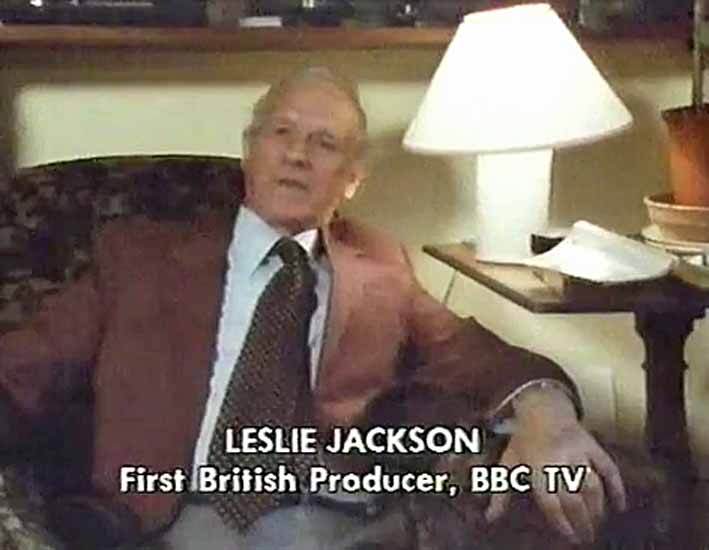
With Leslie Jackson as Producer, This Is Your Life became a huge success and ran for nine series with high viewing figures
Leslie was enthusiastic about the programme despite the BBC's initial reservations about its suitability for British audiences due to the potential intrusion into private life. The show was thought to be in bad taste, but in Leslie's hands, it became a huge success and ran for nine series with high viewing figures. The subjects - Leslie strongly objected to the term "victim" - were always treated with tact and dignity, and each script and production was supervised by Leslie with infinite care.
After the BBC cancelled This Is Your Life in 1964, Leslie went on to produce the panel show Call My Bluff, another long-running popular success, which he continued working on until BBC regulations forced him to retire in 1970.
Leslie worked voluntarily for an eye charity benefiting Moorfields Hospital and later worked for the Ministry of Overseas Development, training staff in television production. He worked at the National Coal Board for three years, liaising between them and BBC and ITV on drama productions such as The Corn Is Green and How Green Was My Valley.
Much of his time was devoted to the Catholic Stage Guild, and for many years, he worked for the Holy Family Church in Acton, where he died suddenly after attending mass in 1992.
He and his wife had three children - Paul, who followed him into the BBC as an Assistant Floor Manager, leaving as a light entertainment producer to further his career in commercial television; the only daughter, Ceri, a professional actress; and Sean, who opted for a successful career in catering and hotel management.
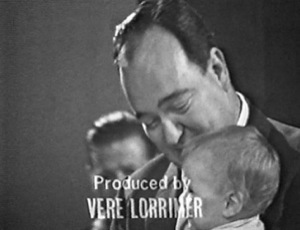
Vere Lorrimer, who was born on 8 June 1920, trained at the Fay Compton School of Dramatic Art before entering the theatre as an assistant stage manager and small part player at the Palace Theatre, Watford.
His early career was interrupted by the outbreak of the Second World War, and having enlisted with the Royal Signals, Vere had reached the rank of Major by the time he was tasked with organising transport for D-Day. During the last year of the war, he joined Stars in Battledress, for which he directed and acted in several revues.
After the war, he worked haphazardly as a stage manager, actor and pianist, often returning to Watford before his aspirations turned to directing. He was later appointed artistic director of the Royal Artillery Theatre, Woolwich, where he remained for several seasons before presenting several tours as a freelance producer/director.
In the late 1950s, Vere joined BBC Television, making his directorial debut with the children's programme Playbox, hosted by Eamonn Andrews. He went on to direct episodes of the BBC's first soap opera, Compact, as well as innumerable episodes of Dixon of Dock Green, Z Cars and Softly Softly. His other drama credits include Doom Watch, A Life of Bliss and The Brothers.
He directed many editions of This Is Your Life between 1958 and 1963, including those featuring novelist Barbara Cartland, racing driver Stirling Moss and actress Hattie Jacques.
When original Producer Leslie Jackson was promoted to Executive Producer, Vere took over the Producer role for the programme's ninth and final BBC series in 1963, which included such subjects as comedian Harry Worth, actress Margaret Lockwood and singer Petula Clark.
His other credits as a producer at the BBC include the final series of Blake's 7 in 1981, the second series of Tenko in 1982, and the drama serials The Dark Side of the Sun and Maelstrom.
After he retired from the BBC, Vere embarked on a new career teaching film and television at several drama schools. He died on 1 October 1998.
Producers Leslie Jackson and Malcolm Morris discuss aspects of This Is Your Life in an extract from a BBC Did You See? special, broadcast in 1986 - The Story of This Is Your Life
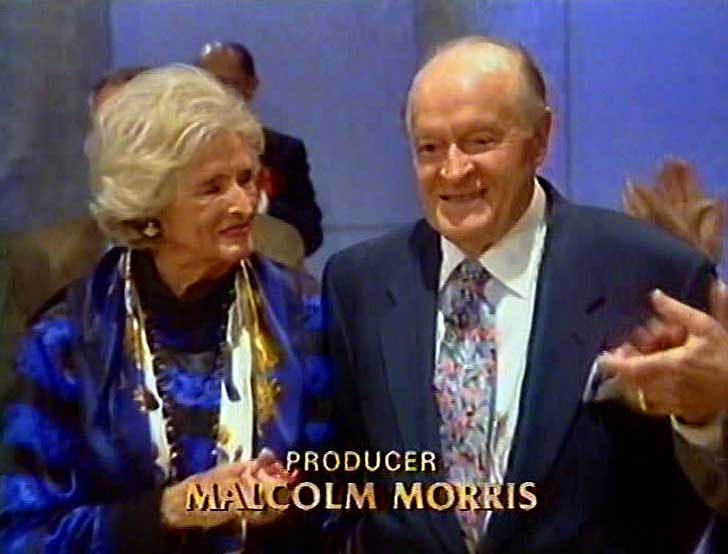
Malcolm Morris was born on 29 August 1932 in North London, where his family ran a hairdresser's salon, 'Maison Morris', in the Caledonian Road.
After leaving school at the age of 14, Malcolm trained at the Morris International School of Hairdressing and later found work with an exclusive salon in Hampstead, but was obliged to return home to help run the family business when his father was taken ill.
He enjoyed photography in his spare time and would eventually move away from hairdressing to try and make a career out of his hobby. He signed up with a Fleet Street agency, and his early assignments included covering the film premieres, which were regularly held in London's West End.
In the mid-1950s, the respected journalist Edward Bishop invited Malcolm to go into partnership with him, and together they established a television news press agency, with Malcolm concentrating on the photography side of the business. He worked extensively in the BBC studios at Lime Grove and Alexandra Palace, and it was during this time that he first met Eamonn Andrews while photographing broadcasts of What's My Line? and, ironically, This Is Your Life.
However, it would be sixteen years before Malcolm would be professionally involved with This Is Your Life. In the meantime, his career took him in several directions. In 1956, he accepted an offer to move to Manchester to join the newly established commercial television station ABC Television as a trainee director.
Malcolm then spent five years as a director, from 1959 to 1964, with the newly created Tyne Tees Television in Newcastle - a period he would describe as 'without doubt the happiest of my life'.
Meanwhile, in a surprising move, back at the BBC, This Is Your Life was cancelled in 1964 after nine series, and with his other show, What's My Line?, also now off-air, presenter Eamonn Andrews left the corporation and took up residency with rival broadcaster ABC Television.
Malcolm was invited back to ABC to produce Eamonn's new late-night chat show – The Eamonn Andrews Show - and it was here he met and worked with the writing team of Tom Brennand and Roy Bottomley, who would later form a vital part of the production team on the soon to be revived This Is Your Life.
Eamonn's chat show, which proved to be a ratings winner attracting such diverse star guests as Muhammad Ali, Noel Coward and The Beatles, was prematurely cancelled when, in 1968, the government reviewed the Independent Television Authority's regional franchises, resulting in the creation of Thames Television from a merger between ABC and Rediffusion.
Malcolm's next move was a return to Tyne Tees Television as programme controller - but it was short-lived!
This Is Your Life returned to television in 1969 when Eamonn Andrews resurrected his old BBC show with the newly formed Thames Television. The first two series had been produced by Robert Tyrrell, an old colleague of Malcolm's at Tyne Tees. When Robert announced he was leaving the show in 1971, Brian Tesler, Director of Programmes for Thames, offered Malcolm the vacant position.
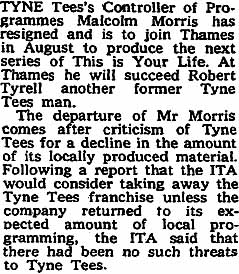
The Stage 3 June 1971
Tyne Tee's Controller of Programmes Malcolm Morris has resigned and is to join Thames in August to produce the next series of This Is Your Life. At Thames he will succeed Robert Tyrrell, another former Tyne Tees man.
The departure of Mr Morris comes after criticism of Tyne Tees for a decline in the amount of its locally produced material. Following a report that the ITA would consider taking away the Tyne Tees franchise unless the company returned to its expected amount of local programming, the ITA said that there had been no such threats to Tyne Tees.
The first three series Malcolm produced regularly topped the ratings and featured such subjects as footballer George Best and singer Shirley Bassey.
He ended this first period as Producer in 1974 by surprising, for a second time, the man who had been the programme's very first subject back in 1955 and presenter of each edition since - Eamonn Andrews!
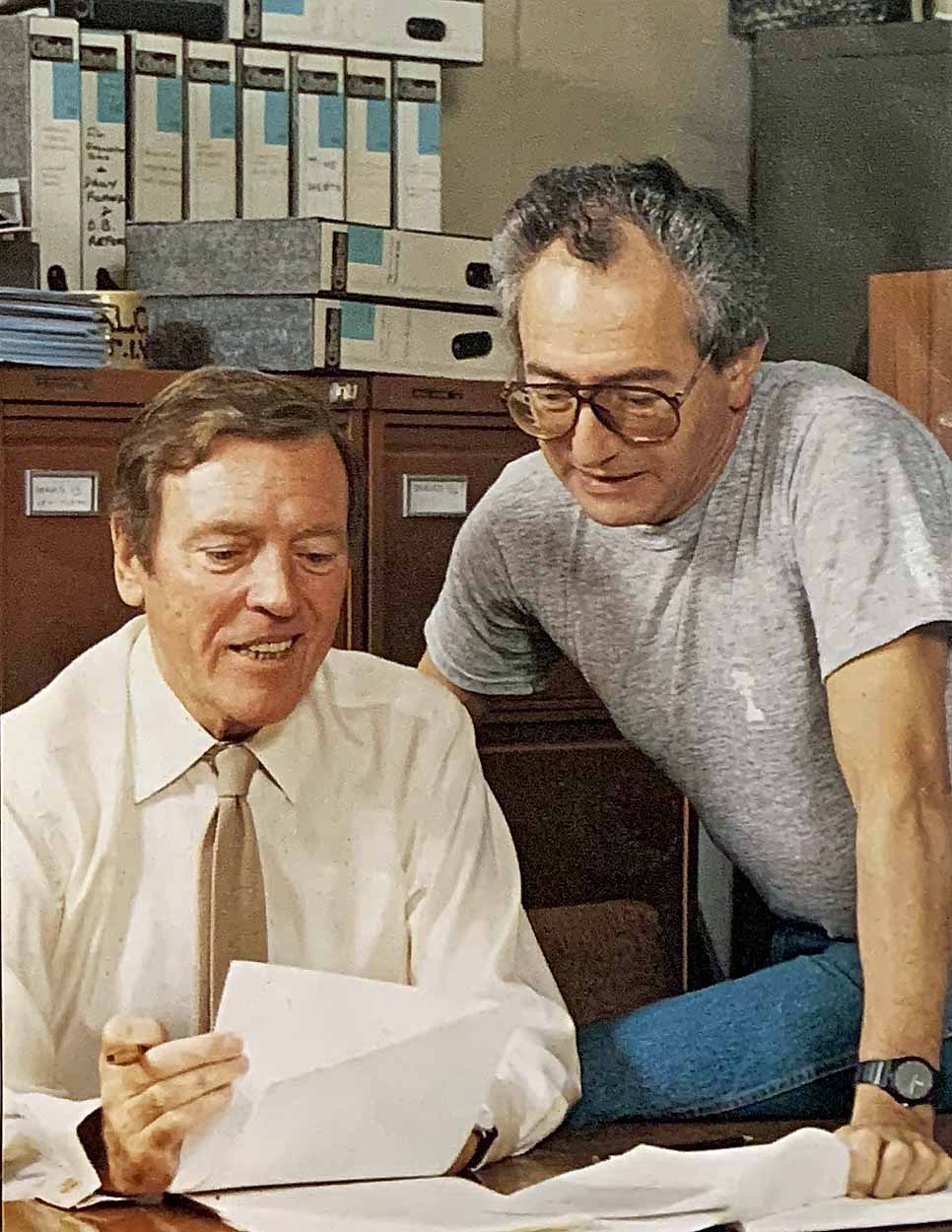
Malcolm Morris had a long working relationship with Eamonn Andrews.
Jack Crawshaw took over the reins as This Is Your Life Producer in 1975 to allow Malcolm to take up the rather elaborate-sounding role of Controller of Administration for the Programme Department at Thames, a role with the responsibility of a 30 million pound budget.
Malcolm returned to produce This Is Your Life in 1982 and would stay with the programme until 1996, overseeing the show through some challenging times – notably the untimely death of presenter Eamonn Andrews in 1987 and the move back to BBC Television in 1994.
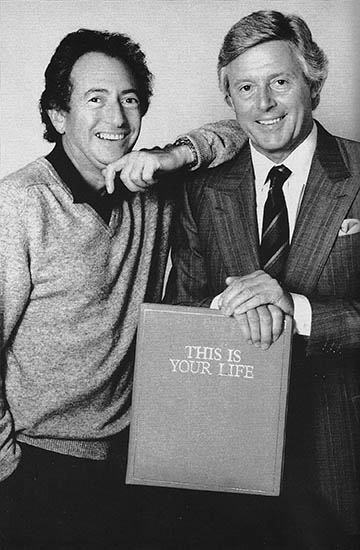
Producer Malcolm Morris with Michael Aspel, who became the new host of This Is Your Life in 1988
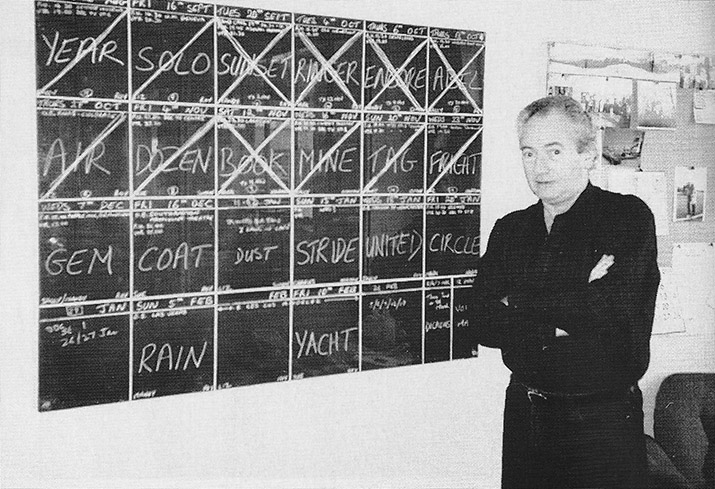
Scheduling the running order for the 1994/95 series - all in code to ensure secrecy
While the programme continued to capture the imagination of the viewing public as the television institution it had become, Malcolm played his part in the show's ongoing success with the introduction in 1988 of a new presentation style with new host Michael Aspel.
Malcolm left This Is Your Life at the end of series 36 in March 1996 and published his memoir, This is My Life, a month later.
Malcolm retired to Los Angeles, California, and died on 2 February 2016.

Series Producer Jack Crawshaw was a stalwart of This Is Your Life, working with both Eamonn Andrews and Michael Aspel in two spells totalling 20 years. A former Fleet Street journalist, he was a researcher and writer for Eamonn when the programme was first aired by Thames Television on ITV in 1969.
After four series, interspersed by summer breaks as a founder writer working with Judith Chalmers on the holiday series Wish You Were Here..?, he was appointed Editor of the 'Life' and in 1974 promoted to Producer, leading the team as the programme consistently topped the ratings with audiences of up to, and sometimes more than, 20 million viewers, paying tributes to the likes of Lord Mountbatten, Dame Vera Lynn, Sir Douglas Bader, Sir Garfield Sobers, Eric Sykes and Muhammad Ali.
In April 1978, Jack and Eamonn co-wrote the book Surprise Of Your Life, which, in a rare move, revealed the dramatic stories behind several editions of This Is Your Life.

Jack Crawshaw was promoted to Producer of This Is Your Life in 1974 and led the team, including presenter Eamonn Andrews, as the programme consistently topped the ratings with audiences of up to, and sometimes more than, 20 million viewers
In 1982, after a series combining his role as Producer of the Life with that of Editor working with Eamonn on Top of the World, a satellite quiz programme linking London, Miami and Sydney, he moved on to Sport and Outside Broadcasts in a new role as a Producer / Director, where his credits included ITV Sport's Midweek Sport Special, with Steve Rider, Fatima an Olympic Story with Brian Moore and International Gymnastics, including the World Championships from Montreal and the World Cup from Beijing, with Dickie Davies, John Taylor and Monica Phelps.
In 1989, he left Thames to set up home in Spain as a new base to pursue a freelance career. His first commission brought him back to London to produce LWT's Arts Festival 1990 with Melvyn Bragg, followed by Live from Telecom Tower with Michael Aspel. Next stop was Stockholm, where he was invited by Lars Noren to produce Aldrig i Livet, a studio debate on the future of Swedish health care for Nordic Channel 5, fronted by John Chrispinsson.
Back in Britain, he was invited by ITV's new franchise holder in the south to produce Meridian The First Year with Fred Dinenage, followed by a one-hour commemorative special for the ITV network, as Writer and Producer of D-Day Remembered, which won an award at the New York TV Festival in the Best International News / Documentary category. Another New York award winner he produced for Meridian was Doing It Up, a DIY series with Pattie Coldwell and Tony Kerner.

Jack Crawshaw was asked to return to This Is Your Life to work with Michael Aspel, first as Editorial Consultant and then as Series Producer
In August 1996, with Thames now an independent company, part of the Pearson group, and about to enter the final year of a three-year contract to produce This Is Your Life for the BBC, he was asked to return to the programme to work with Michael Aspel, first as Editorial Consultant and then, for a further six years up to its final run, as Series Producer. In his two spells on This Is Your Life, spanning 34 years, he was involved in more than 500 editions and co-wrote, with Eamonn Andrews, the book 'Surprise of Your Life'.
Between television assignments Jack, who began his working life as a teenage sports reporter on his hometown newspaper the Oldham Evening Chronicle, covering Manchester's famous football clubs, United and City, in the days of Busby, Charlton, Law and Best, wrote personality features for the PFA magazine Footballer's World and scripts for the opening ceremonies of the 1991 Rugby World Cup at Twickenham, presented by Cliff Morgan, and UEFA's Euro '96 at Wembley, with John Inverdale.
He has also worked as a Radio Interviewer, contributing feature interviews for the UK independent network with Bobby Charlton on World Cup Soccer, Jim Meadowcroft, World Championship Snooker, Nicky Horne, US Superbowl, Jimmy Greaves, on his book 'It's a Funny Old Life' and Gordon Taylor, Chairman of the PFA, on Football in the Community.
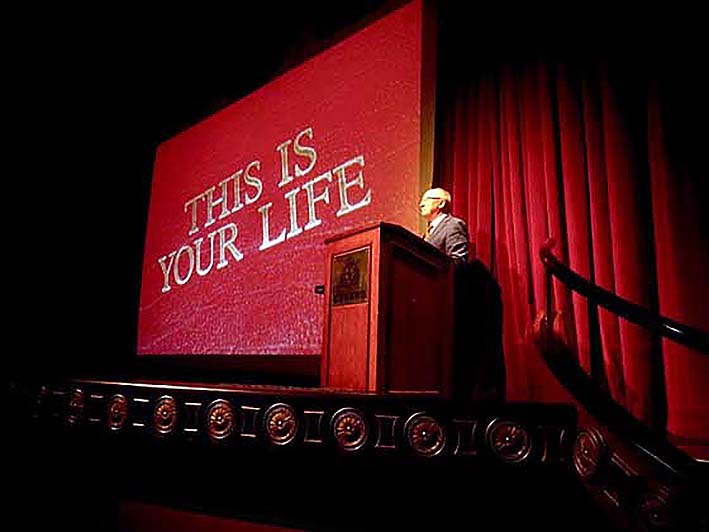
Jack Crawshaw has recently entertained audiences on Cunard cruise ships with stories and anecdotes from his days as Producer of This Is Your Life
Jack has recently made regular appearances as a Guest Speaker on cruise ships, including Cunard's Queen Elizabeth and Queen Victoria, informing and entertaining his audiences with stories and anecdotes from his days as Producer of This Is Your Life.
Jack is married and lives with his wife Lynne and children, Ellie and Charlie, in Farnham, Surrey.
Producer Jack Crawshaw recalls This Is Your Life in a clip from Channel 5's Top of the Box, broadcast in June 2018, highlighting a year in the show's history - 1978.

As a journalist, I have recorded, in faltering shorthand script, the words of the first man to set foot on the moon.
I have seen an American President under siege from anti-Vietnam demonstrators burning torches outside Claridges Hotel.
Once I shared a railway carriage with a football team who had just won the F.A. Cup and, with less enthusiasm, I joined a midnight police hunt for three dangerous women on the run from prison.
I have applauded first nights in the theatre and winced at near last nights in the boxing ring.
But none of these memories, set aside for my old age, have provoked anything like the discussion prompted by my latter day role as the Producer of "THIS IS YOUR LIFE".
The question, "Is it really a surprise?", is one Eamonn and I are asked more often than inquiries about our own health, wealth and happiness.
The answer is as simple as the question is inevitable.
"It most certainly is" - as has been testified by so many men and women for whom our admiration and respect has inspired us to prepare a surprise salute beginning ...... THIS IS YOUR LIFE.
So important is the surprise that if we thought for one moment our chosen guest of honour knew our plans we would cancel the presentation.
Why is it so important? First of all, it is more fun for the guest.
Secondly, it protects him - or her - from any accusation of immodesty in accepting our tribute. The This Is Your Life production team pride themselves professionally on the pains taken to ensure the secret is kept. And it is kept so well because the nearest and dearest whom we first contact know that that is where a great deal of fun lies.
Planning the surprises is a prosperous pastime for those who value a sense of humour. What may have been a highly tense moment at the time becomes a big laugh on looking back, the frightening narrow escape an amusing reminder to take more care on the next trip.
At the party afterwards the dawning realisations provide the biggest chuckles ..... "So that's why she made me change my suit this morning" ..... "So that's why he cancelled our lunch date" ..... "So that's why the children went to see their grandmother a day early" ..... "So that's why the car broke down on the way to the station".
It was while reflecting on some of these moments that we decided to thumb through the pictures taken at the very second our guests were given the "surprise of their life". Every picture tells a story...
JACK CRAWSHAW
LONDON 1978